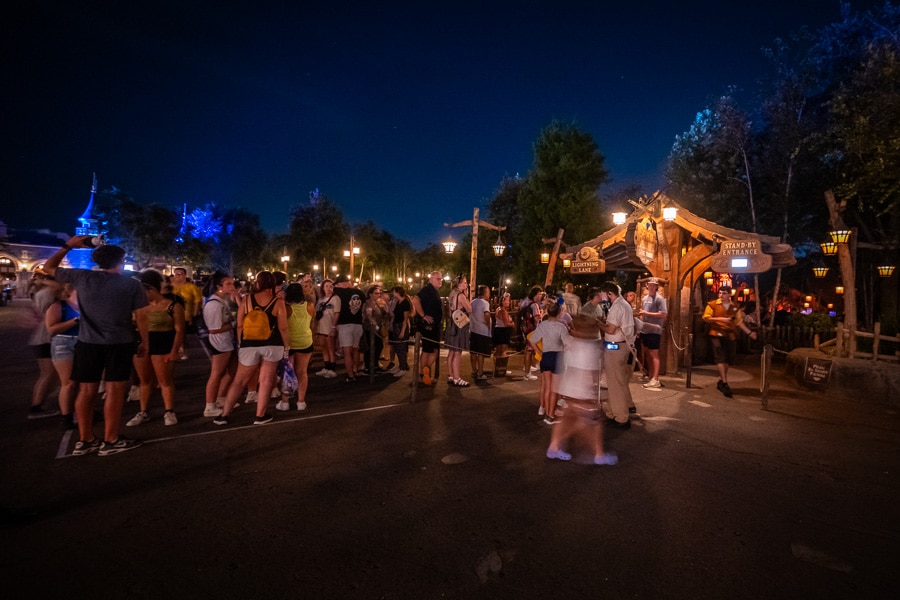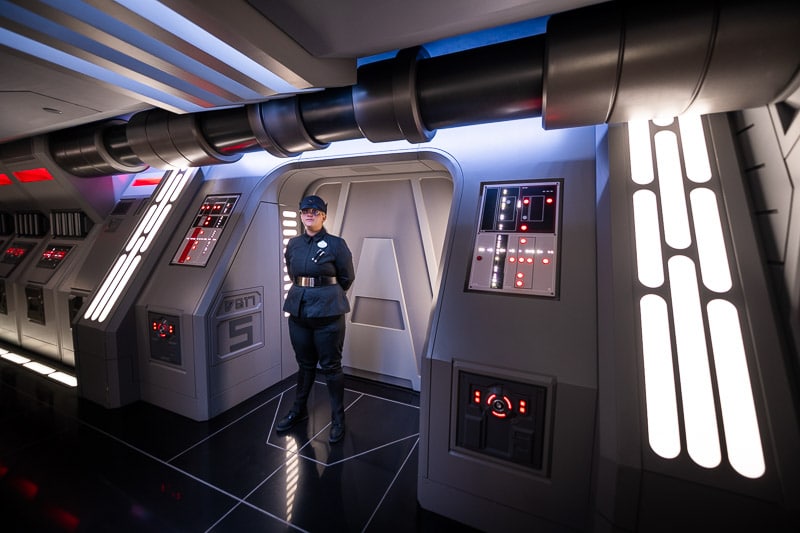
Walt Disney World has once again made changes to its Disability Access Service website, this time updating rules and clarifying guidelines for the registration process. This covers details of the new policies, while also recapping other recent revisions and what else might be on the horizon.
As quick background, Disney overhauled DAS at Walt Disney World last May. According to the company, the changes were due in large part to abuse, misuse, and proliferation of the program’s use–with issuances of DAS tripling from 2019 to last year. For more about the specifics of the overhauled DAS, see Disability Access Service (DAS) Changes at Walt Disney World FAQ.
The new system has now been in place for over a year, and there have been direct impacts for disabled guests as well as indirect ones for all guests. To the latter point, we’ve written a lot about the impact of the DAS changes on wait times at Walt Disney World. Most recently, in Is Lightning Lane Multi Pass Still “Worth It” at Disney World? Suffice to say, standby lines are shorter and faster moving, with wait times being lower year-over-year as a result of the DAS crackdown.
We’ve also covered the reports from readers and other guests applying for accommodations at Walt Disney World, many of whom have had incredibly negative, invasive, humiliating, and dehumanizing experiences with the new process. We continue to receive reader comments and messages to this effect on a near-daily basis, which comes as no surprise given there are likewise viral social media posts about DAS, none of which are positive, once every few weeks.
Suffice to say, even over a year later the DAS overhaul remains controversial. It’s also a highly sensitive subject that is very personal since it is, quite literally, make or break for some guests trying to experience Walt Disney World. There have been widespread reports of guests who previously had DAS being denied and advised to use alternative accommodations, some of which are new–or are revised and highlighted more prominently.


The latest change is that Walt Disney World has an expanded section on the official DAS website with rules, polices, guidelines–whatever you want to call them–for the video call to reduce guest confusion and clarify how the process works.
As you might be aware, Walt Disney World requires guests to participate in such a video call to determine DAS eligibility. These new rules on the website are a welcome addition; we’ve received countless messages from readers who are confused about how this works, and Walt Disney World was previously (purposefully?) vague with specifics. It didn’t help that the interview process is now materially different than October 2021 through April 2024, and still differs between Disneyland and Walt Disney World.
Anyway, here’s the new/revised/updated/expanded verbiage:


Speak with a Cast Member
When you’re ready to chat with a Cast Member to determine eligibility for DAS, you can engage in a live video chat using the “Request Live Video Chat” button below.
Make sure the device has a working camera and a microphone. You must review and accept the Terms & Conditions before requesting a live video chat.
Important things to note:
- Live video chat is available from 7:00 AM to 8:00 PM Eastern Time.
- The recording of this video chat is strictly prohibited.
- The Guest requesting DAS either for themself or for someone else (e.g. a minor child) must be 18 years of age or older to register
- The Guest for whom DAS is being requested must be present during the video chat.
- If you’re not logged in to the Walt Disney World website, you’ll be prompted to log in.
- If you don’t have an account, you’ll need to create one before continuing.
- If you don’t have valid theme park admission, you’ll need to link valid theme park admission for each member of your party.
- Guests using a mobile device or tablet will need to download the Zoom application to connect to the video chat.
- Video chat is screen reader-friendly for Guests with visual disabilities and available with text chat for Guests with hearing disabilities.
- At this time, live chat is offered in English only.


This is now the fourth change to Disability Access Service in 2025.
Prior to this, both Walt Disney World and Disneyland extended the validity period for Disability Access Service upon a guest being accepted into the program to one year or the length of the ticket (whichever is shorter). Prior to this up to 365 day window, DAS was valid for up to 240 days before re-registration.
The big beneficiary of that change was Annual Passholders, and meant that they would not have to re-register for DAS two-thirds of the way through their AP validity window. That made DAS more convenient for locals and other regulars, while also adding a layer of predictability, and it came right as the first wave of DAS Annual Passholders would’ve been up for renewal.


Another major change was the extension of the DAS registration window to 60 days prior to their park visit, which also occurred on both coasts. Previously, the process could begin no sooner than 30 days prior to your visit. That occurred back in early February.
That extension was aimed at making it easier for guests to plan around DAS and potentially cancel or modify their vacations if they do not receive DAS as an accommodation. Going from 30 to 60 days resulted in a negligible increase in DAS applications, but it doesn’t materially change the equation on approvals. It was all about reducing friction for guests who apply and are denied DAS, as it put the earlier-applicants outside of the penalty-free cancellation period.
With the extension of DAS applications to 60 days, guests are able to make an informed decision about their status and cancel if they’re denied and feel visiting Walt Disney World will not be feasible or desirable without the DAS accommodation. Guests who booked vacation packages who apply for DAS sufficiently early will be able to receive full refunds as a matter of policy.


Disney also revised its policy language to remove “only” from the Disability Access Service eligibility criteria to potentially broaden the qualifying guests.
As we pointed out at the time, that likely involved involvement from an army of attorneys, and even then, its motivations and outcomes are open to interpretation and debate. My best guess is that Disney wants to soften the perceived limitations in the policy among prospective applicants.
To make it appear less harsh or stringent, to encourage guests other than those with developmental disabilities to apply for DAS. It could be a way of unofficially expanding the scope of eligibility without making any substantive changes to the policy or overhauling the program yet again.


While we’ll never know for sure what prompted the “only” change or what result it’ll have on the ratio of approvals to denials, our view is that it’s fairly consequential in the quantity of DAS issued despite being only a single word.
The motivation for the “only” change might’ve been the Disability Access Service Class Action Lawsuit Filed Against Disney Parks. The complaint relies heavily on the presence of “only” in Disney’s previous DAS policy, and a demand letter from last December that preceded the lawsuit.
I would also add that there all of the previous changes in 2025 came right around the time of that lawsuit. In the ~5 months since the last change occurred, which was right around the one-year anniversary of the DAS overhaul, Walt Disney World has been pretty quiet as to the Disability Access Service program. This is the first change since then, and it’s comparatively inconsequential.


Previously, we expressed optimism that hopefully Walt Disney World was starting to listen and soften its approach to Disability Access Service in a measured manner. That if there were a big dial on DAS policy intensity, Disney cranked it from the minimum to the maximum last year.
The likely goal of ping-ponging from one extreme to the other was eradicating abuse, making it clear that the company was serious about DAS and would only grant it in the most extreme scenarios–and scammers need not even bother.
Now that word has gotten out that DAS is a serious policy and not just a rubber-stamp formality, it appeared that Disney was taking that big DAS dial and reducing the intensity of the process. Back after those changes in the first few months of the year, we predicted that more changes were in the pipeline as the new-look DAS crosses its 1-year anniversary, with the company searching to find more of a middle ground. That wishful thinking now appears to be wrong.


I’m not sure what prompted the latest change about the video calls, but unlike the others, it appears insignificant.
If I had to guess, this expanded policies were driven in equal parts by a desire to reduce guest confusion and also make it clear that recording of the video chat is strictly prohibited. Honestly, I wouldn’t be the least bit surprised if that ‘strictly prohibited’ verbiage was the important part (given all of the viral social media content), but Disney didn’t want to add that alone, drawing attention to it–or the why of it.
I don’t know, and it doesn’t seem worthwhile to fixate on this since, again, it’s a fairly inconsequential change. The bigger news, if anything, is the non-news and lack of changes in the last ~5 months. Between DAS now being over a year old and the lack of meaningful changes since its anniversary, it would seem Disney has settled into a comfortable policy position with the program.
The news cycle has largely moved on, which is not to say that there isn’t still outrage or heartbroken guests, but that they’re not garnering as much attention or negative coverage. Even the DAS advocacy group that was once active in opposing the changes has largely gone dormant; I’ve received 3 press releases from them in the last 7 months, and none since August. At one point, their updates were near-weekly.


Even as the news cycle has largely moved on, we maintain our position that Disney should find this middle ground. If anything, they should do this precisely because DAS changes don’t garner the same kind of attention, so reform could be accomplished without inducing as much abuse.
The company has an exemplary reputation for guest service and accommodations. Or the company did, prior to last year around this time when the new-look DAS rolled out. Part of these changes are absolutely understandable, there was rampant abuse exacerbated by social media, entitlement, and Disney creating an incentive for DAS scammers by monetizing line-skipping via Lightning Lanes.
There’s no un-ringing that bell and going back to 1990s or 2000s versions of accommodations. The world is a different place. Disney cannot relax its rules too much, or else risk a return to the system being scammed.


There have also been heartbreaking stories of DAS denials, many of which have gone viral for good reason. These have made clear that a more flexible and humane approach offering greater discretion to Cast Members is optimal.
This strongly suggested that Disney went too far with the DAS overhaul; the pendulum swung from one extreme to another, and there has been a lot of collateral damage among disabled guests who needed DAS and have been denied under the overly-stringent system.
Cranking the DAS dial to its maximum setting hasn’t just eradicated the scammers, it has hurt guests who are actually disabled. It’s time to recalibrate from the extremes to the center.


Ultimately, we do not anticipate any major changes to DAS at Walt Disney World or Disneyland. There is not going to be another overhaul to Disability Access Service, absent the aforementioned class action lawsuit or other litigation prevailing.
That happening is highly doubtful–Disney has been sued over every single iteration of these accommodations, and I’ve yet to find any record of them losing on any count. The company has already endured a lengthy PR hit over these changes, there’s zero chance they’ll voluntarily endure that again with another overhaul.
What, if anything, does happen will be a slow trickle of rule relaxations. But with no major changes in the last 5 months, even that is now looking increasingly unlikely.


The most obvious change we’d like to see is a “humanizing” of the interview, not just expanded rules and policies for the mechanics of that process. We’ve heard from many readers who have been denied, and there’s a word that has been used repeatedly to describe the process: interrogation. While we can appreciate how stressful this process is for Cast Members and the verbal abuse they take for disgruntled guests, there’s a better way of handling the process that feels less adversarial.
This wouldn’t be an actual public-facing policy change, as it would be almost impossible for the company to convey. Disney probably isn’t going to write in its FAQ that “the interview is now an interview, instead of a scene from Star Wars: Rise of the Resistance.” The Disney Legal team might be reluctant to approve that verbiage.
Given that this would happen without an official policy change, it’s possible that it’s already occurred! I somehow doubt that, though, given recent reader complaints. It also doesn’t seem like strictly prohibiting recording of the video chat is a rule that would’ve just been implemented if those calls were getting better. That’s just a hunch, though.
Planning a Walt Disney World trip? Learn about hotels on our Walt Disney World Hotels Reviews page. For where to eat, read our Walt Disney World Restaurant Reviews. To save money on tickets or determine which type to buy, read our Tips for Saving Money on Walt Disney World Tickets post. Our What to Pack for Disney Trips post takes a unique look at clever items to take. For what to do and when to do it, our Walt Disney World Ride Guides will help. For comprehensive advice, the best place to start is our Walt Disney World Trip Planning Guide for everything you need to know!
YOUR THOUGHTS
Thoughts on the latest change to DAS rules at Walt Disney World? Would you like to see Disney further adjust the big DAS dial, reducing the intensity setting? Hopeful that further changes will be made that result in increased approvals for those who truly need DAS while keeping abuse low? Agree or disagree with our assessment of the changes or policy as a whole? Please try to stay on topic–we’ve noticed some of these DAS comments sections get heated and personal. Discuss the policy itself, not others’ use (or lack thereof) of it.










